We’ve had some issues with emails going to hotmail, outlook and related addresses. If you’ve recently made a purchase using one of these and not received a confirmation email, please get in contact with us – use an alterative email address for contact or purchase if you can.

For all things fantasy, horror, and speculative fiction
Announcement:
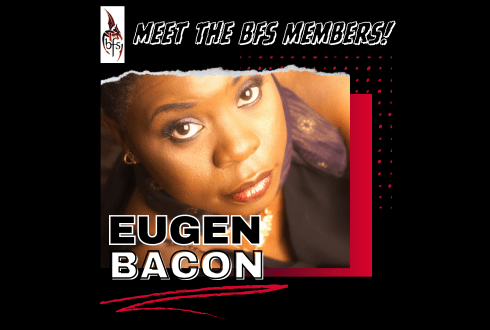
Meet Eugen Bacon
Every Friday, we meet a member of the BFS and peer deep into their soul (or, at least, a form they filled out). Want to be featured? Email us: online@britishfantasysociety.org
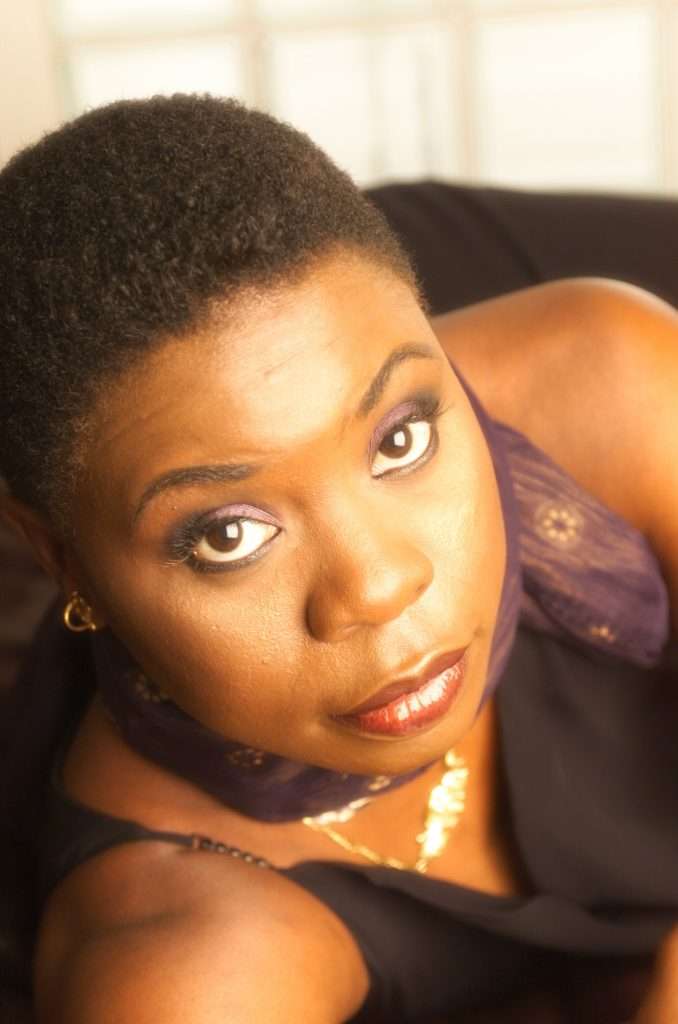
Name, including preferred pronouns:
Eugen Bacon (she/her)
Which region are you based in?
I’m Down Under—which has its own considerations when writing down under. And when I say I’m from Melbourne, no one’s asking me: ‘Is it Mount Melbourne in Antarctica, or Melbourne, Nova Scotia? Melbourne, Quebec, Melbourne, Arkansas, Melbourne, Florida, or the one in Derbyshire, or East Riding of Yorkshire, or Cambridgeshire in the UK?’
What genres I write
I write across genre—think of me as the queen of genre bending. I’ve just finished a novel that’s a science fiction, dark fantasy, literary mystery with an Afrocentric bend, so it’s black speculative fiction with a futurism backdrop. My novel Mage of Fools is an Afrofuturistic dystopian novel with elements of dark fantasy. A few collections of my short stories, including Chasing Whispers (2022) and the upcoming A Place Between Waking and Forgetting (2024), both by Raw Dog Screaming Press, have been termed Afro-irreal.
Are you drawn to any specific SFFH sub-genres?
I love everything, especially the literary weird and slipstream fiction (think Andrew Hook). Anthologies and single-author collections take me to heaven from the diversity of the genres and sub-genres they canvas. Not so crazy about hard science fiction, because some authors, in my view, focus too much on the technical details of worldbuilding and lose sight of characters and their relationships with themselves, and the world, and others—all the social and cognitive elements, together with the playfulness of language, that are important to me in connecting with a book.

Your influences
Tell us about the book/film/thing that got you into SFFH: What was it? How old were you? What impact did it have on you?
It wasn’t just one thing. I’ve always been an avid reader from a young age, I cut my tooth on African literature, reading books by Camara Laye, Chinua Achebe and Margaret Ogolla—how and why stories: ‘How the zebra lost her stripes’. Later, I found fascination with the works of Marion Zimmer Bradley, J. R. R. Tolkien, Mary Shelley, George R. R. Martin…
Before he was famous, G.R.R. Martin wrote a short story, ‘The Ice Dragon’, whose heroine is a cold little girl, so pretty, who never loves back—Adara has just lost a mother, and will only accept hugs in winter, and she has a special connection with an ice dragon. I fell in love with this story, and also with ‘The Lonely Songs of Laren Dorr’—another girl, Sharra, whose hair is a coal-black waterfall, and she’s trapped between worlds. The story goes:
The beginning of her story is lost to us, with the memory of the world from which she sprang. The end? The end is not yet, and when it comes we shall not know it. We have only the middle, or rather a piece of that middle, the smallest part of the legend, a mere fragment of the quest. A small tale within the greater, of one world where Sharra paused, and of the lonely singer Laren Dorr and how they briefly touched.
I fell in love with the language and the characters, and knew that I wanted to write like that. Then I met Toni Morrison with her Tar Baby, Jazz, Sula, Beloved… and I knew this was the ilk of writer I wanted to become—one completely at home with her stories.
How does that early influence show up in your work now?
In an interview with The Guardian, Toni Morrison (pictured below) said something I deeply identify with:
For me, Art is the restoration of order. It may discuss all sort of terrible things, but there must be satisfaction at the end. A little bit of hunger, but also satisfaction.
In another interview, also with The Guardian, she also said, I want to feel what I feel.
I think I write first for myself—my writing is a question, a curiosity, a connection or disconnection with a character, a search for meaning that might in the end unravel a better question…
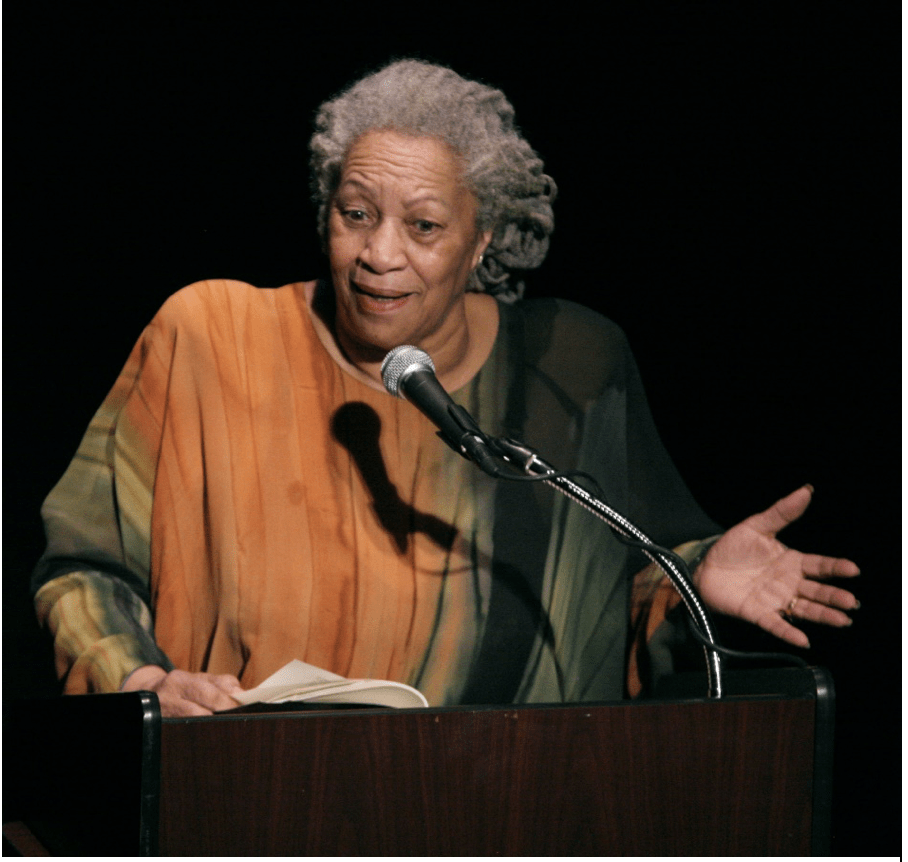
Where do you draw your creative inspiration from?
Stories are everywhere! Real life offers a good source—you have only to turn on the local news, see the headline on a tabloid, hear the tail of a conversation inside a train or a restaurant. Ideas cartwheel in little word associations every which way, unfound plots flirting around you. Sometimes I begin with a prose poem that germinates into a story.
Who do you look to as a genre hero? Why?
She’s not especially a genre hero, as most of her work is associated with literary fiction, but Toni Morrison is my writerly mentor. I think fondly of her words: All water has a perfect memory and is forever trying to get back to where it was.
She taught me an insatiable enchantment with text and language, and my writing, however sombre the topic, is always play.
Your work
You’re stuck in an elevator for 60 seconds with that hero, and they want you to describe your work. Give us the pitch.
Mama Morrison, I am writing this story about being, belonging, the existential, othering, sentience. It’s a flash fiction that’s a psychological horror set in an Afrocentric world, where a person who has died doesn’t know they have died and is shocked to find themselves in Eh’wauizo, the spirit realm of the ancestors. They hope to rest in the solace of Our Mother, the Creator, but there are fates worse than death, and this death is not an ending.
What are you working on right now?
I’ve just finished a novel and a collection of short stories around the Sauútiverse, a shared world inspired by the Swahili word ‘sauti’, which means voice or sound. The Sauútiverse has five main planets, each named to mean ‘song’ in an African language. Inhabitants practice sound magic. I’m casually writing more stories in this world, including per above pitch.
Thinking about all the stories/work you’ve done, what sticks out most in your mind? Why?
I love all my babies—what true mother doesn’t? But I have a special connection with Claiming T-Mo, the very first novel that launched my professional writing. It was the creative artefact of my PhD, and Meerkat Press (my favourite publisher—don’t tell the others) acquired it. Claiming T-Mo was released in the same year as its cousin, an adaptation of the PhD dissertation, Writing Speculative Fiction, by Bloomsbury Academic.
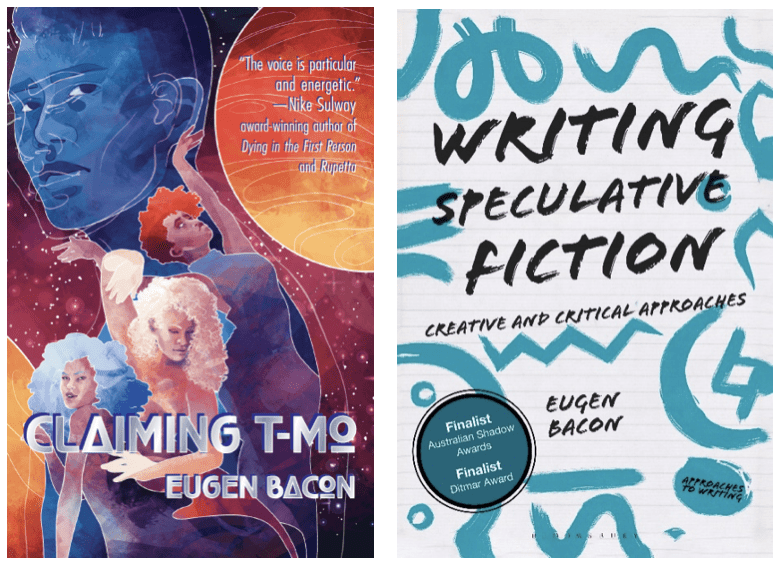
Where and when do you create/are you at your most creative?
I feel things deeply, and I am at my most creative when I am experiencing an intense emotion: love, joy, grief, disdain, anguish, outrage, loss…
What’s the best advice you’ve received about creativity?
Dominique Hecq, a scholar, friend, mentor—she was my PhD supervisor—who looked at the potential usefulness of psychoanalysis for the creative writer:
I write to answer incipient questions that trouble my mind … I write to relieve some form of anxiety, the question of anxiety being the unanswerable question par excellence, since the object cause of anxiety, the shadow of Das Ding, cannot be symbolized … In this sense, I write because I must do so, exhilarating, detestable or painful though this might be. That writing is my jouissance, the paradoxical satisfaction that I derive from my symptom and the excesses of an enjoyment that is closer to pain than pleasure, would hardly be surprising.
What’s your writing soundtrack?
Believe it or not—the news on telly. Depends on the channel and the level of noise (unruly conversations), which determines the volume I put the sound on. Sometimes I put my headphones and play all my music that ranges from Sia, Bad Wolves, Coldplay, Tina Turner, Yvonne Chaka Chaka, The Wombats, Abba, Usher, some newest vibe that’s caught my fancy… on shuffle. The volume has to be just right—unintrusive.
The quickfire round
Sci-fi, fantasy or horror?
Bugger. All.
Quiet or loud?
Quiet.
Dark or light?
Dark.
Strict lines or genre blend?
Total blend.
Awards or bestseller?
Most are biased or rigged. I just like an author, like I did Morrison, and buy everything.
Fiction or non-fiction?
Fiction.
Poetry or prose?
Prose poetry.
Plotter or pantser?
Pantser for short stories. Plotter for novellas, novels.
Reading or listening?
Reading.
Notebook or computer?
Notebook.
Favourite SFFH book of all time?
The entire Toni Morrison collection as one unit. Seriously.
Last book you read?
Those That Pursue Us Yet by Kyla Lee Ward. Bloody hell. So good. Straight after The Sixth Sentinel, a graphic novel by A. Manzetti & S. Fantelli. Wowsa!
Any SFFH author on auto-buy?
Toni Morrison
Favourite podcast?
Jean-Paul Garnier’s Space Cowboy Books
The home stretch
What’s the best thing about being a SFFH writer?
Speculative fiction is a safe space in which to write. It offers an escape, an imagined place we can find a getaway. Good fiction can travel you through time, take you back to your childhood, connect you with a mystical character. You can explore your place in the universe, ask fundamental philosophical questions, interrogate the past and learn from it to shape a better future.
Time to plug your stuff! Where can we find you and your work? What have you got coming up? Consider this your advertising space.
My hottest books right now:
- An Earnest Blackness, a British Fantasy Award winner
- Serengotti, a literary mystery set in Australia, shortlisted in the Victorian Premier’s Literary Award
- Danged Black Thing, a Philip K Dick Award nominated book
Look out this 2024 for A Place Between Waking and Forgetting and Afro-Centered Futurisms in Our Stories, a creative nonfiction featuring some awesome African writers. Sold by literary agent Jennie Goloboy, Donald Maass Literary Agency.
Check out my latest time travel collaboration with Andrew Hook, Secondhand Daylight.
If you’re into prose poetry, I’ve just released Texture of Silence (with Steve Simpson).
Find more of my work at eugenbacon.com
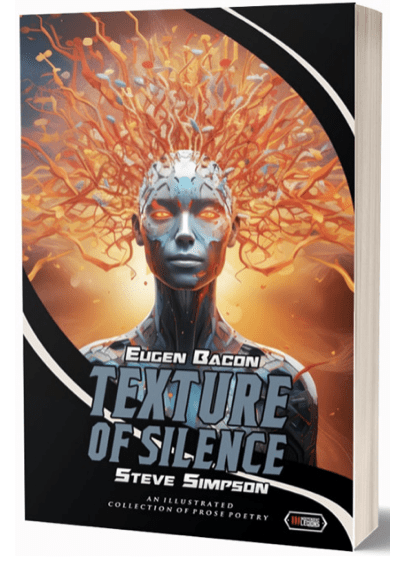
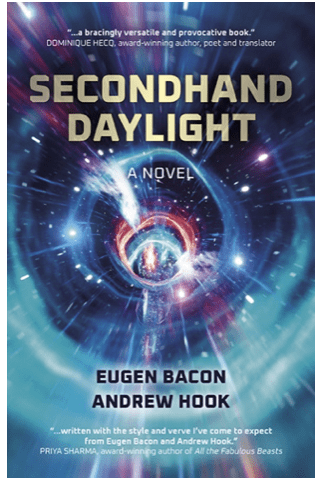
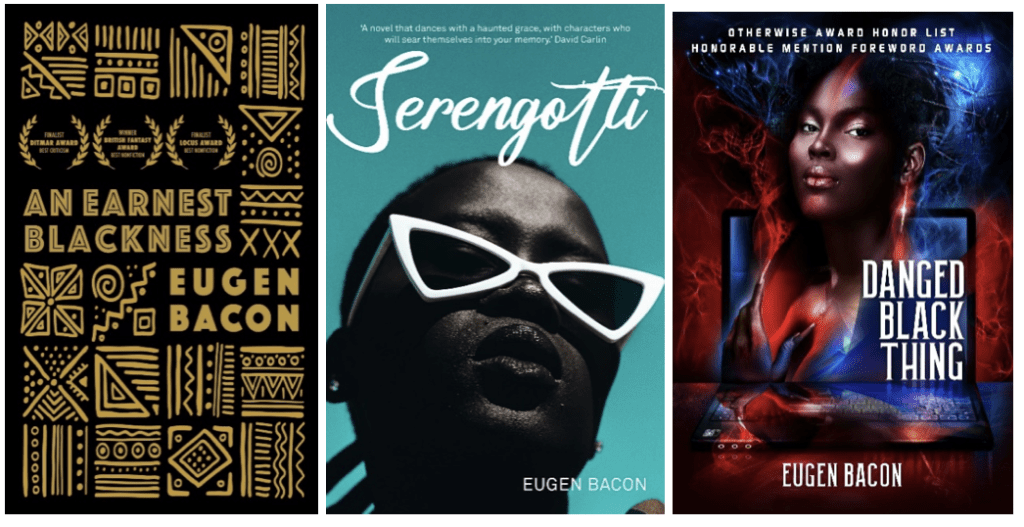
Bio:
Eugen Bacon is an African Australian author of several novels and collections. She’s a British Fantasy Award winner, a Foreword Indies Award winner, a twice World Fantasy Award finalist, and a finalist in other awards. Eugen was announced in the honor list of the Otherwise Fellowships for ‘doing exciting work in gender and speculative fiction’. Danged Black Thing made the Otherwise Award Honor List as a ‘sharp collection of Afro-Surrealist work’, and was a 2024 Philip K Dick Award nominee. Eugen’s creative work has appeared worldwide, including in Apex Magazine, Award Winning Australian Writing, Fantasy, Fantasy & Science Fiction, and Year’s Best African Speculative Fiction. Visit her at eugenbacon.com.